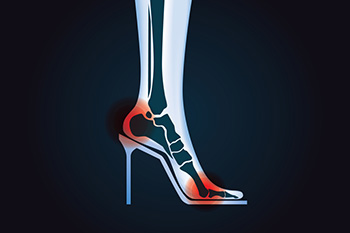
Please contact our office to schedule an appointment or for more information.

Swollen feet during pregnancy, a common discomfort known as edema, can affect expectant mothers due to various physiological changes. As pregnancy progresses, the body retains more fluid to support the growing fetus and prepare for childbirth. This increased fluid retention, combined with hormonal shifts and changes in blood circulation, can lead to swelling in the feet and ankles. The expanding uterus can also exert pressure on blood vessels, impeding the return of blood from the lower extremities and contributing to swelling. Additionally, the body produces more progesterone during pregnancy, which relaxes the walls of blood vessels and contributes to fluid buildup. Factors such as standing or sitting for prolonged periods, high ambient temperatures, and a diet high in sodium can also worsen swelling. While mild foot swelling is typically normal during pregnancy, severe or sudden swelling may indicate a more serious condition, such as preeclampsia, necessitating prompt medical attention. If the swelling of your feet has become a problem during your pregnancy, it is suggested that you confer with a podiatrist who can regularly monitor this condition.
Pregnant women with swollen feet can be treated with a variety of different methods that are readily available. For more information about other cures for swollen feet during pregnancy, consult with Dr. Thomas Tran from Southwestern Foot & Ankle Associates, P.C.. Our doctor will attend to all of your foot and ankle needs.
What Foot Problems Can Arise During Pregnancy?
One problem that can occur is overpronation, which occurs when the arch of the foot flattens and tends to roll inward. This can cause pain and discomfort in your heels while you’re walking or even just standing up, trying to support your baby.
Another problem is edema, or swelling in the extremities. This often affects the feet during pregnancy but tends to occur in the later stages.
How Can I Keep My Feet Healthy During Pregnancy?
If you have any questions please feel free to contact our office located in Frisco, TX . We offer the newest diagnostic and treatment technologies for all your foot and ankle needs.

Preventing falls in elderly individuals is vital for maintaining health, independence, and quality of life. Falling can seriously impact the feet, which can cause difficulty in completing daily tasks. An important step is ensuring the home environment is safe and free from hazards such as loose rugs, cluttered pathways, and slippery floors. Installing handrails and grab bars in key areas like bathrooms and staircases can provide added support and stability. Encouraging regular physical activity, including balance and strength exercises, helps improve muscle tone and coordination, reducing the risk of falls. Ensuring proper footwear with nonskid soles and adequate support further enhances stability and reduces the likelihood of slips or trips. Regular vision and hearing check-ups are essential for maintaining sensory function and awareness of surroundings. Additionally, reviewing medications with healthcare providers to identify any potential side effects or interactions that may contribute to dizziness or instability can help mitigate fall risks. If you would like more information about how to keep your home safe to prevent falling in addition to protecting your feet, it is suggested that you confer with a podiatrist.
Preventing falls among the elderly is very important. If you are older and have fallen or fear that you are prone to falling, consult with Dr. Thomas Tran from Southwestern Foot & Ankle Associates, P.C.. Our doctor will assess your condition and provide you with quality advice and care.
Every 11 seconds, an elderly American is being treated in an emergency room for a fall related injury. Falls are the leading cause of head and hip injuries for those 65 and older. Due to decreases in strength, balance, senses, and lack of awareness, elderly persons are very susceptible to falling. Thankfully, there are a number of things older persons can do to prevent falls.
How to Prevent Falls
Some effective methods that older persons can do to prevent falls include:
Falling can be a traumatic and embarrassing experience for elderly persons; this can make them less willing to leave the house, and less willing to talk to someone about their fears of falling. Doing such things, however, will increase the likelihood of tripping or losing one’s balance. Knowing the causes of falling and how to prevent them is the best way to mitigate the risk of serious injury.
If you have any questions, please feel free to contact our office located in Frisco, TX . We offer the newest diagnostic and treatment technologies for all your foot care needs.

Women's footwear choices, whether flat, mid-heel, or high-heeled, can significantly influence foot health and overall well-being. Flat shoes, while often considered comfortable and practical, may lack proper arch support, leading to issues such as fallen arches or plantar fasciitis. Mid-heel shoes provide a compromise between style and comfort, offering a modest lift without placing excessive strain on the feet and calves. However, prolonged wear of mid-heel shoes can still contribute to foot pain and discomfort, particularly if the shoes lack adequate cushioning or support. On the other hand, high-heeled shoes, while stylish and elongating, can cause a myriad of foot problems, including bunions, hammertoes, and metatarsalgia, due to the increased pressure and instability they place on the feet and ankles. If any of the above foot conditions have developed from wearing high heels, it is suggested that you consult a podiatrist who can guide you toward effective treatment strategies.
High heels have a history of causing foot and ankle problems. If you have any concerns about your feet or ankles, contact Dr. Thomas Tran from Southwestern Foot & Ankle Associates, P.C.. Our doctor can provide the care you need to keep you pain-free and on your feet.
Effects of High Heels on the Feet
High heels are popular shoes among women because of their many styles and societal appeal. Despite this, high heels can still cause many health problems if worn too frequently.
Which Parts of My Body Will Be Affected by High Heels?
What Kinds of Foot Problems Can Develop from Wearing High Heels?
How Can I Still Wear High Heels and Maintain Foot Health?
If you want to wear high heeled shoes, make sure that you are not wearing them every day, as this will help prevent long term physical problems. Try wearing thicker heels as opposed to stilettos to distribute weight more evenly across the feet. Always make sure you are wearing the proper shoes for the right occasion, such as sneakers for exercising. If you walk to work, try carrying your heels with you and changing into them once you arrive at work. Adding inserts to your heels can help cushion your feet and absorb shock. Full foot inserts or metatarsal pads are available.
If you have any questions please feel free to contact our office located in Frisco, TX . We offer the newest diagnostic and treatment technologies for all your foot and ankle needs.
Copyright © Southwestern Foot and Ankle Associates, P.C. | Site Map | Nondiscimination | Design by: Podiatry Content Connection